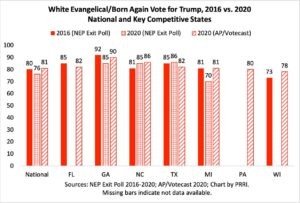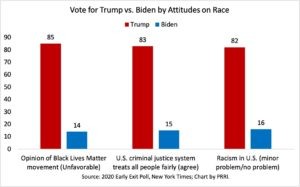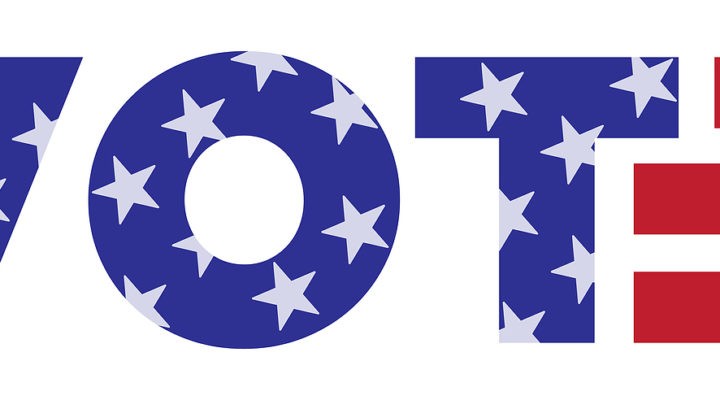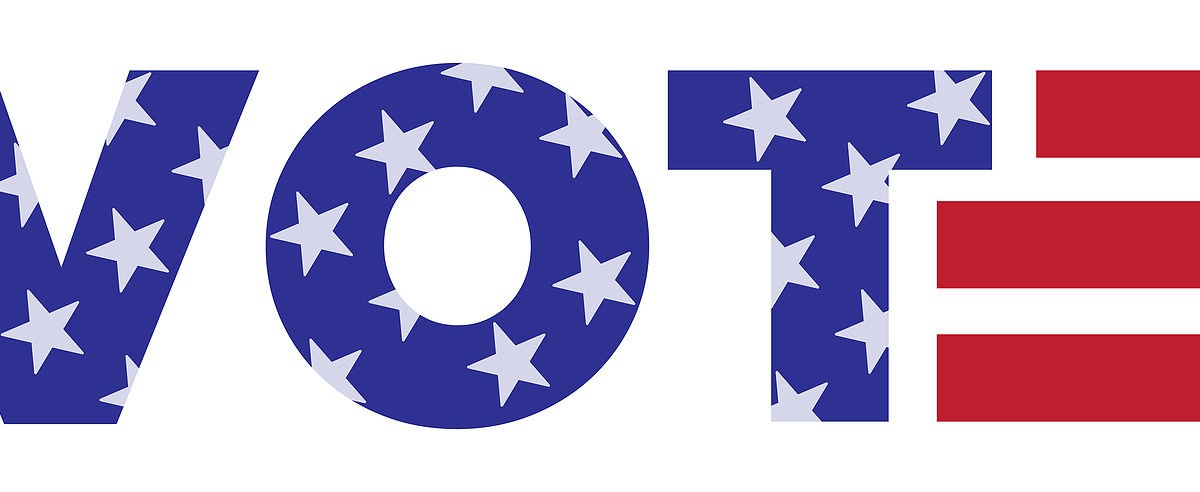Religious identity trends appear to have held fairly steady in the 2020 presidential election, based on a combination of exit polling and pre-election surveys.
Because of the enormous number of Americans who voted by mail or in advance this year, caution has been urged in interpreting traditional exit polls, which in many states would capture more Republican views than Democratic views. Nationwide, Democrats were more likely to vote early or by mail, while Republicans were more likely to vote in person on Election Day.
On race. Much is being made of how Black women helped propel Joe Biden to win the election, which presents a direct tie culturally to the Black Christian church. Oddly, more Black men supported Donald Trump in this election than in 2016, but those men still represented a distinct minority.
The political divide between Americans who are white and those who are not white continued to be huge.
The political divide between Americans who are white and those who are not white continued to be huge, with an estimated 57% of white voters choosing Trump compared to only 12% of Black voters. Trump did better with Hispanic (32%) and Asian (31%) voters but did not carry a majority in any non-white population. His net non-white reach is estimated to be 26%, compared to 72% for Biden.
Protestants in general (62%) and white evangelical Protestants in particular (76% to 82% depending on the report) continued to vote Republican. White evangelical Christians are estimated to have been 27% of all voters in this election, and Protestants of all kind made up 62% of the electorate.
On Catholics. One place a small shift was noted is among Catholics, with 51% choosing Biden over Trump. The general Catholic vote often is evenly split but this year saw a slight tilt among white Catholics toward Biden, who is himself a white Catholic.
Ryan Burge, a political science professor at Eastern Illinois University, told the Catholic publication Crux: “I think religion played a big role (in the Rust Belt), especially among white Catholics, and that may have been enough for Trump to lose. That might be the difference in the whole game. Those Catholics might actually be the reason Joe Biden is going to be the president and not Donald Trump.”

Graphic courtesy of PRRI.
On evangelicals. White evangelicals, however, were not moved.
NPR reported: “A notable fact in 2016 was that exit polls showed about 80% of white evangelical Christians supported Trump in spite of his unfamiliarity with the Bible, his divorces, his vulgar rhetoric and his association with porn stars. Trump’s reputation in moral terms hasn’t changed all that much during his time in office, but there is little evidence of slippage among these faith voters.”
Burge told NPR: “I think the Democrats should stop thinking about white evangelicals entirely. And I think the Republicans should take them for granted. At some point, it’s like, what can you do to make them change — on the Democratic side or the Republican side?”
On ‘nones’. The third-largest voting bloc by religious affiliation is the so-called “nones,” those Americans who claim no religious label. The Washington Post reported this group accounted for 23% of voters, just slightly less than the number of Catholic voters. The religiously unaffiliated also kept true to form and highly favored the Democratic ticket 65% to 30%.

Graphic courtesy of PRRI.
On social issues. Key social issues that have been on the minds and in the sermons of mainline and other progressive Protestant churches did not register highly with Trump voters but were highly motivating for Biden voters. For example, when asked which is more important, 80% of Biden voters and 18% of Trump voters chose “containing the coronavirus now, even if it hurts the economy.” Asked the opposite way, “rebuilding the economy now, even if it hurts efforts to contain the coronavirus,” was motivating to 76% of Trump voters and 22% of Biden voters.
Enormous gaps continued in voter attitudes about other social issues such as the Black Lives Matter movement, the fairness of the criminal justice system and whether racism is a major or minor problem in America today. Trump voters overwhelmingly (more than 80%) have unfavorable views of Black Lives Matter, believe the criminal justice system treats all people fairly and believe racism is only a minor problem today or no problem at all. By contrast, only 14% to 16% of Biden voters believe these same things.
On Mormons. As anticipated, this election did produce some shift in the Mormon vote, particularly in Arizona, which was a key battleground state. The Desert News reported on a survey taken just two weeks prior to the election that found the percentage of Arizona Mormons who voted for Trump in 2016 (75%) would be about the same in 2020 (76%). However, while only 9% of Arizona Mormons said they voted for Hillary Clinton in 2016, double that number said they would vote for Biden this year.


